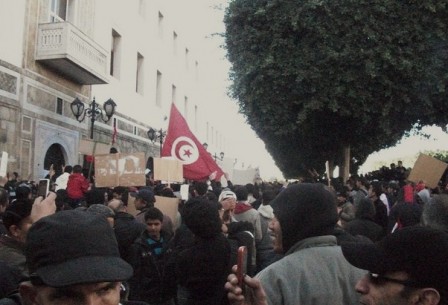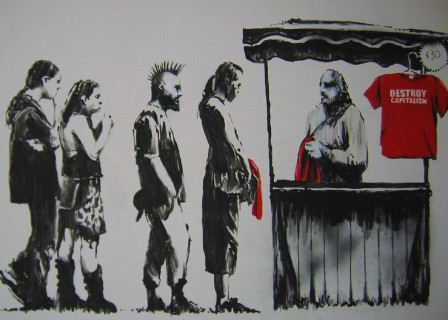Tunisia, WikiLeaks And Food Crisis: Forces For A Global Revolution

NEWS JUNKIE POST
Jan 24, 2011 at 5:14 pmIt would be hard to contest that our world is in crisis, or at least at a turning point. The models which were developed at the start of the industrial revolution have either failed or are crumbling in front of us in “real time”. If communism died in the 80’s with the collapse of the Soviet Union, capitalism is now on life support. Nothing was revolutionary about the industrial revolution, but instead the industrial leviathan enslaved workers and started destroying our ecosystem by its immense appetite for resources and for burning energy.
The ruling transnational elites, either in the corporate, financial or political sectors, are now operating outside national boundaries with complete disregard for local populations. To an American businessman, it doesn’t matter if his home town is experiencing double digit unemployment if he can find a cheaper way to fabricate a product in China or India. Workers in both China and India are paid meager wages, which barely allow them to survive but allow the Chinese or Indian counterpart of the US businessman to become wealthy in the process. Globalization has made capitalism into a destructive machine of wealth concentration without any concerns for the “worker bees” producing the wealth, and for the damage it creates to our environment by draining our resources.
Global Food Crisis: The Gathering Of A Perfect Storm
The global food crisis is expected to get worse in 2011. It is due to speculation on commodities and land, climate change and overpopulation. Worldwide we have now some major systemic problems on both sides of the food scarcity equation: supply and demand. Both parameters are driving up food prices.
On the demand side the main factors responsible are commodities and land speculation by global financial markets, a demographic explosion and the use of crops for fuel. On the supply side, the loss of crop land to non-farming activities, diversion of water to city areas and climate change, with its heat waves and floods, are already taking a dramatic toll on our ability to produce more food.
What global capitalism, both at the level of governments and of corporate mega-players, should do (but won’t) for its own survival is to redefine security, and shift spending from military and policing purposes to investing in solutions to really tackle the emergency of climate change, water scarcity and overpopulation.The path that we are currently following is unsustainable and is likely, like it did in Tunisia, to fuel social unrest against national and transnational ruling elites.
Tunisia’s Revolution Effect: Igniting A Pan-Arabic Secular Uprising For Democracy
There is no more doubt that Tunisia’s Jasmine Revolution is not only likely to succeed, but is also spreading quickly through the region like wildfire. Today, a Tunisian general, Rachid Ammar, who refused to back dictator Ben Ali’s crackdown on protesters, vowed to protect the revolution as the transition government is going through a major reshuffle to exclude elements of Ben Ali’s regime. General Ammar, who is hugely popular in Tunisia for his role in ousting Ben Ali, said that the Tunisian army would act as “guarantor of the Revolution”.
“Our revolution, your revolution, the revolution of the young risks being lost. There are forces that are calling for a void, a power vacuum,” General Ammar told a cheering crowd speaking through a megaphone. On Saturday, thousands marched to the capital Tunis in what they called a “caravan of liberation”. Protesters want anybody affiliated with Ben Ali’s regime out of the government. “You stole the wealth of the country, but you are not going to steal the revolution,” chanted the demonstrators.
The “contagion” of the Tunisian uprising has already ramifications in Algeria, Yemen and Jordan by inspiring popular protests. On Tuesday, it will be the turn of Egypt where Egyptian organizers are trying to start their version of the Tunisian revolution, and are calling it: “The day of revolution against torture, poverty, corruption and unemployment”. Meanwhile, protests by self-immolation or other public suicides are daily occurrences In Egypt and Algeria. A big rally is called for tomorrow in Cairo and Alexandria, and organizers are on social media sites such as Facebook challenging Egyptians to stand up like their Tunisian brothers. “On January 25, we have to show the world that we are not a cowardly submissive people. We are not less than Tunisians,” said one of the organizers.
WikiLeaks And Social Media: Information And Activism Gone Viral Fuel The Global Revolution
In the last couple of years we had globally a few mishaps where hope for change and reforms were squashed before they could blossom. It was of course the Green movement in Iran, the Red Shirts in Thailand, and social unrest in Greece in the aftermath of the global financial crisis. Many activists in Iran and elsewhere are trying to keep what could have been a new revolution in Iran alive using social media such as Twitter and Facebook. It is the same with the Red Shirts in Thailand, and the anti-globalization and the anti-capitalism movement in Europe.
But so far, in either case, political activists have failed to make these movements gel. However, it doesn’t mean that the respective failures in Iran, Thailand and Europe are permanent setbacks, it could just be an issue of timing. One of the key ingredients for success still largely missing in the attempts was WikiLeaks.
What WikiLeaks did, and will keep doing regardless of Julian Assange’s fate, was to make an astronomical amount of information, kept secret by governments, widely available to the public worldwide. For example, Tunisians found out from the leaked US State Department cables that Ben Ali was hosting lavish dinners at one of his mini-palaces where fancy French ice cream was served after being shipped, by air, on one of Ben Ali’s private jets.
In two days, the global governmental and transnational corporate elite will be meeting in Davos, Switzerland. The 2011 thematic for Davos’ “masters of the universe” is to reflect and discuss “Shared norms for the new reality”. The global elite will “chew the fat” (more likely the caviar and oysters) and will be asked by the organizers to ponder on “the fact that we live in a world that is becoming increasingly complex and interconnected, but also experiencing an erosion of common values and principle”.
However, they should reflect on the fact that they could shortly be in a precarious situation. It is both ironic and insulting for the organizers to mention an “erosion of common values and principles” when they clearly belong to the very small group of people plundering the world’s resources and wealth. Only profit matters for global capitalism, not conscience or even real analytical abilities. The global elite should reflect on the gathering storm on the horizon, and what could become the overwhelming power of the many versus the few. The ingredients are accumulating to make a successful recipe for a global, and hopefully semi-peaceful, revolution.
Editor’s Note: To view some great photographs of the events unfolding in Egypt by Ahmed Shokeir click here.
Related Articles
- January 29, 2012 Has Occupy Forgotten Why?
- February 13, 2011 Global Revolution: Will the Many Finally Triumph Over the Few?
- February 16, 2011 US Foreign And Budget Policies: Putting Bandages On The Titanic
- January 16, 2011 Tunisia’s Jasmine Revolution: Spreading Fear Among Arab Dictators
- March 7, 2011 Overpopulation, Climate Change, Food Crisis, War: The Horsemen Of Apocalyptic Capitalism
- January 30, 2011 Arab People: From Powerless To Proud

















11 Responses to Tunisia, WikiLeaks And Food Crisis: Forces For A Global Revolution
You must be logged in to post a comment Login